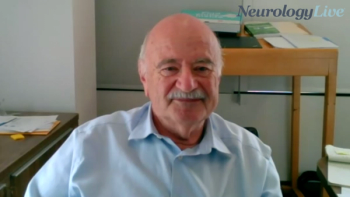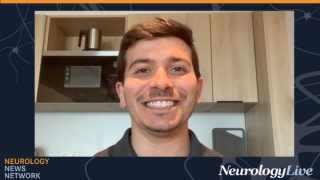
Dementia and Alzheimer Disease
Latest News


Zervimesine Robustly Slows Geographic Atrophy Lesion Growth in Latest Phase 2 MAGNIFY Data
Latest Videos

CME Content
More News

Nexalin plans to submit a Q-Submission to the FDA for its Gen-2 SYNC system, aiming to advance trials for Alzheimer disease, dementia, and mild cognitive impairment following positive internal data and FDA feedback.

Mind Moments®, a podcast from NeurologyLive®, brings you an exclusive interview with Elizabeth Head, PhD. [LISTEN TIME: 20 minutes]

From Neurology Enthusiast to Advocate for Health Equity: Moira Kapral’s SEQUINS Hall of Fame Journey
Moira Kapral, MD, MSc, reflects on her SEQUINS Hall of Fame recognition, the evolution of brain health equity, and her work addressing disparities in stroke care.

Robert J. Adams, MS, MD, reflects on his SEQUINS Hall of Fame recognition, his work on stroke prevention, and the importance of equity in brain health.

Barbara Vickrey, MD, MPH, discusses her SEQUINS Hall of Fame honor, the evolution of healthcare delivery models, and the role of mentorship in fostering equity in neurology.

Lewis B. Morgenstern, MD, reflects on his SEQUINS Hall of Fame recognition, the importance of health equity research, and his ongoing efforts to reduce stroke disparities.

Cheryl Bushnell, MD, MHS, a professor of neurology at Wake Forest University, discussed her SEQUINS Hall of Fame recognition, her work on sex differences in stroke risk, and her ongoing efforts to improve stroke care equity.

The findings support the neuroprotective effects of GLP-1RAs and SGLT2is, suggesting their possible role in Alzheimer disease prevention strategies in people with type 2 diabetes.

The chief of ophthalmology at the Doheny Eye Institute discussed decades of research uncovering how Alzheimer can impact visual function and how retinal imaging may advance diagnosis. [WATCH TIME: 13 minutes]

The neuroradiologist at Mayo Clinic discussed the clinical and conceptual differences between Alzheimer disease diagnostic frameworks and how clinicians should prepare for a shifting treatment landscape. [WATCH TIME: 4 minutes]

Sonya Miller, medical director at TauRx, discussed the latest clinical data and development plans for HMTM, a potential oral therapy targeting tau pathology in Alzheimer disease.

Ken Mariash, chief executive officer at Sinaptica, provided commentary on new data from the company’s SinaptiStim neuromodulation system, highlighting its clinical promise in slowing Alzheimer disease progression through targeted, non-drug brain network stimulation.

Take 5 minutes to catch up on NeurologyLive®'s highlights from the week ending April 18, 2025.

Evaluating Safety and Early Outcomes of Lecanemab Treatment for Alzheimer Disease: Philip Kuball, MD
The resident in the Department of Neurology at NYU Langone Health discussed the preliminary findings of a 9-month study on lecanemab recently presented at the 2025 AAN Annual Meeting. [WATCH TIME: 2 minutes]

A duo of neurology experts from Feinberg School of Medicine talked about the diagnostic challenges, evolving understanding, and clinical implications of paraneoplastic neurological syndromes. [WATCH TIME: 3 minutes]

The professor in the Department of Pathology and Laboratory Medicine at the University of California, Irvine, gave clinical insights on efforts to refine neuropsychological outcome measures for individuals with Down syndrome at risk for Alzheimer disease. [WATCH TIME: 3 minutes]

The chief medical officer at Cognito Therapeutics provided a clinical overview on promising findings surrounding the company’s gamma sensory stimulation device in patients with Alzheimer disease. [WATCH TIME: 10 minutes]

Elizabeth Head, PhD, a professor in the Department of Pathology and Laboratory Medicine at the University of California, Irvine, shed light on the emerging research and trials surrounding the interplay between Alzheimer disease and Down syndrome.

Take 5 minutes to catch up on NeurologyLive®'s highlights from the week ending April 11, 2025.

Cleveland Clinic’s $1.1 billion Neurological Institute, opening in 2027, will revolutionize neurological care with a state-of-the-art, patient-centered design integrating advanced technology and innovative care solutions.

In one of the longest trials of brain stimulation in Alzheimer disease, repetitive transcranial magnetic stimulation led to a reduced decline in CDR-SB, as well as positive impacts on cognitive function and functional abilities.

Emer MacSweeney, MD, a consultant neuroradiologist and trial investigator of the phase 3 APOLLOE4 study, provided a clinical view of the latest study findings, and the difficulties with finding treatments for APOEε4/4 carriers of Alzheimer disease.

Catch up on any of the neurology news headlines you may have missed over the course of March 2025, compiled all into one place by the NeurologyLive® team.

A phase 3 trial investigating latozinemab, a monoclonal antibody therapy for frontotemporal dementia because of GRN mutations, reported baseline participant characteristics to better characterize this patient population.

Murali Doraiswamy, MD, MBBS, a professor of psychiatry and geriatrics at Duke University School of Medicine, gave clinical follow-up on a pivotal analysis of the phase 3 APOLLOE4 study testing a novel therapeutic for Alzheimer disease.

















